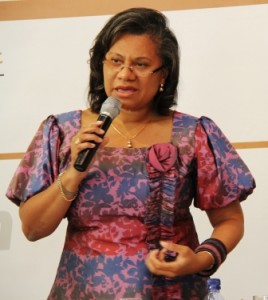As the only surgeon for more than half a million people in Tete province, he might do 10 operations a day, besides regular medical consultations. While in Mocuba, in [...]]]>
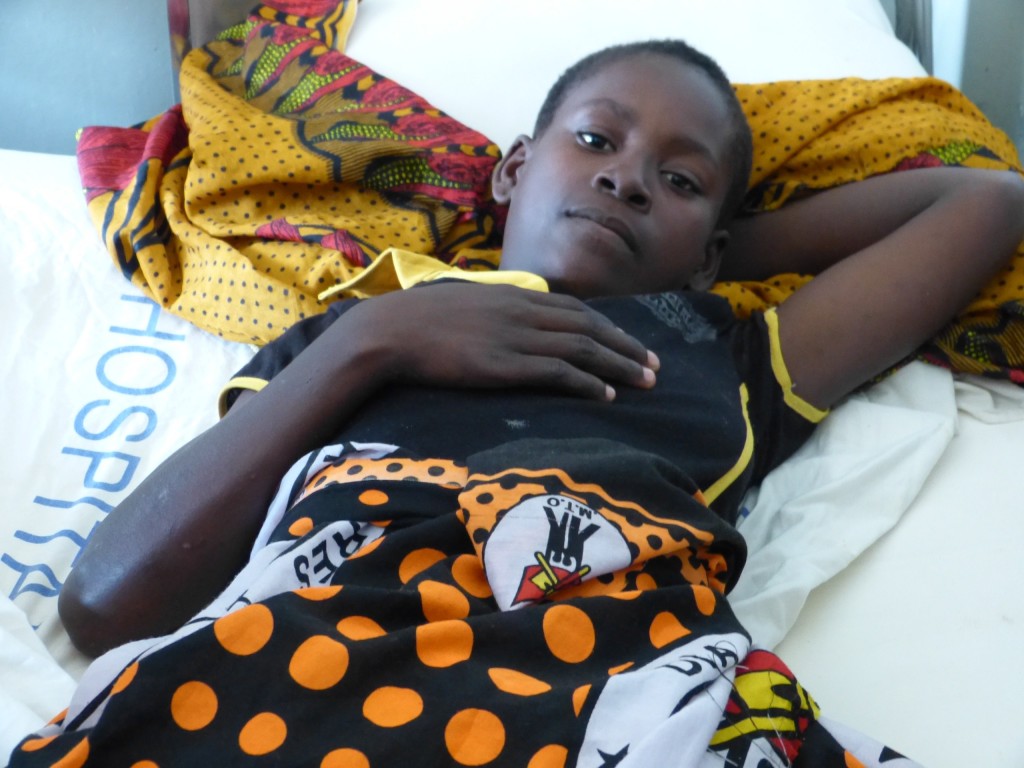
A 15-year-old girl, who was married at age 14, endured two days of obstructed labour, had a stillborn baby, and developed obstetric fistula, recovers from fistula surgery at Nampula Central Hospital, Mozambique. Every year, some 400 women develop obstetric fistula in Mozambique – most are teen mothers and child brides. Credit: Mercedes Sayagues
As the only surgeon for more than half a million people in Tete province, he might do 10 operations a day, besides regular medical consultations. While in Mocuba, in Zambezia province, he performed 1,500 surgeries in one year. The days were long, the conditions harsh, the lack of medical supplies serious. In the mid-1980s, he was happy to welcome the North Vietnamese doctors sent as aid workers. Although they did not share any common language, they were company and shared the long work days.
Marchesini, an Italian priest and doctor, arrived in Mozambique in 1976, just after independence, and just as civil war broke out.
Among all the horrors of war – landmines, bullets, amputations, mutilations, and malnutrition – one plight particularly moved him: the women with obstetric fistula, estimated to be 100,000 in the country.
Obstetric fistula is a lesion that causes a hole in the tissue of the vagina, the urethra or the rectum, leading to urinary or faecal incontinence. It is caused by long and complicated births without proper medical care, when for days the baby’s head pushes on the surrounding tissue, tearing them, according to the United Nations Population Fund.
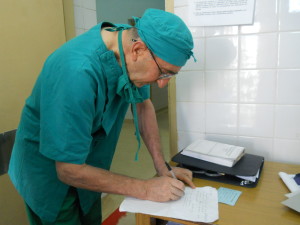
Father Aldo Marchesini processing paperwork in-between operating obstetric fistulas at Beira Central Hospital, in Mozambique. Credit: Mercedes Sayagues/IPS
Marchesini had learned to operate fistula with a missionary in Uganda. In Mozambique, he mastered the delicate surgery and he trained all the local doctors who operate fistula today. Marchesini taught them not only the skills, but the passion and compassion that infuse his work. This earned him the 2014 United Nations Population award, shared with Johns Hopkins University, which will be presented in New York on 12 June.
Every year since 1985, Marchesini and his team of doctors stage “fistula campaigns” in the central and northern provinces. Women from remote districts come to referral hospitals to be free of the incontinence, shame and social exclusion that fistula brings.
Not only did Marchesini operate, he also raised funds in Italy for hospital and transport costs and to help these women start a new life selling used clothes in their homes.
Early on, Marchesini realized that media, especially community radios, were key in the campaign against fistula. Journalists can explain how to avoid it (give birth in hospital, discourage early marriage and pregnancy) and can inform women about treatment and cure. Talking to media was part of Marchesini’s job.
Sometime in the late 1990s, Marchesini contracted HIV, probably, as he told me, “from delivering babies and operating without surgical gloves, which were scarce during the war.” He discovered his status in 2002, during a medical check-up in his home country, Italy, for a stubborn bronchitis.
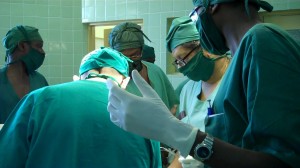
Marchesini (left front), operating with his team in Beira, has taught every surgeon who repairs obstetric fistulas in Mozambique. Credit: Mercedes Sayagues/IPS
“I felt that my life, until then in the same railway carriage as everybody else, had suddenly gone on another train and another railway to a new destination,” he told me. He immediately started on antiretrovirals.
When he returned to Mozambique, although at the time AIDS was surrounded by shame and stigma, Marchesini did not hesitate in going public with his status, to show that HIV knows no social boundaries and that one can live positively with the virus.
He was the first and practically remains the only professional person who is publicly open about living with the virus in Mozambique, where stigma doggedly clings to HIV.
Marchesini’s adventures and reflections as the lone surgeon during the war are recorded in his memoirs, scattered chapters in a lively prose, written in Italian and Portuguese when he goes on holiday once a year. It is a moving history of rural health during a civil war, with a deep tenderness for the plight of children and women.
Today, well over 70 years old, having undergone a cardiac bypass operation last year, Marchesini still works long hours at the hospital in Quelimane, in the northern Zambezia province.
Two years ago, the town threw a party to celebrate his 30 years at the hospital. Hundreds came to thank him. Through northern Mozambique, people call him “o padre milagreiro”, the miracle-making father.
A man of characteristic modesty, Marchesini is uncomfortable whenever he hears this. “I just do my work”, he says.
]]>** Dr. Julitta Onabanjo is the Regional Director for UNFPA’s East and Southern Africa region, stationed in Johannesburg
Recently, a 14-year-old girl from Kakamega County in Kenya gave birth to a set of triplets, fathered by a boy aged 16. The phenomenon of children having babies is not limited to Kenya; it occurs [...]]]>
** Dr. Julitta Onabanjo is the Regional Director for UNFPA’s East and Southern Africa region, stationed in Johannesburg
Recently, a 14-year-old girl from Kakamega County in Kenya gave birth to a set of triplets, fathered by a boy aged 16. The phenomenon of children having babies is not limited to Kenya; it occurs in many African countries.
Fifteen-year-old Ida, from Mozambique, became pregnant when she was 13 years old while 25-year-old Mariel, from Madagascar, got pregnant when just 13 years.
Each year, 7.3 million girls under the age of 18 give birth in developing countries — of these, around 2 million are under 15.
As an African mother, I would not like my daughter, or niece – or any young girl, for that matter – to get pregnant at an early age, not just because it would compromise their life opportunities, but also because medically and psychologically, teenage pregnancy poses high risk for both the adolescent girl and her child.
The trend of children giving birth to children should not be allowed to continue. This is why UNFPA’s State of World Population 2013: Motherhood in Childhood, launched this week, addresses the challenge of adolescent pregnancy head on.
The social drivers of adolescent pregnancy in our society are well known. They include impoverishment, social marginalization and child marriage. Others are limited choices and opportunities in life, or inadequate access to sexual and reproductive health, including contraceptive information and services.
As the report notes, “Every day, 20,000 girls below age 18 give birth in developing countries,” most of them from lower-income rural households. Many of these girls are also nutritionally deficient.
Pregnancy has enormous consequences for a young girl. Broadly speaking, it alters the course of her life, seriously affecting her health, education and income-earning potential.
Pregnancy and childbirth are the leading cause of death for adolescent females in developing countries, resulting in 70,000 deaths annually. Likewise, health problems such as obstetric fistula are more likely if a girl becomes pregnant too soon after reaching puberty.
When girls leave school due to pregnancy or for any other reason, their economic prospects are jeopardised, while their opportunities in life might be severely truncated.
A call to action
Thus, addressing motherhood in childhood requires institutional and community responses, as well as individual commitment. Programmes that target the girl child need to take into account the broader social drivers of the problem.
For instance, we need to address the underlying factors of adolescent pregnancy, including gender inequality, poverty, sexual violence and coercion, child marriage, social pressures, exclusion from education and lack of job opportunities. We must also address the negative attitudes and stereotypes about adolescent girls that contribute to the problem.
An important area of concern is inadequate access to comprehensive sexuality education and youth friendly information and services where their privacy and confidentiality is maintained. Teenagers need to be fully informed on how to protect themselves from unplanned pregnancies.
Adolescents and young people also need holistic development, which focuses on creating a safe and supportive environment for accessing information, services and platforms for participation and advocacy.
Communities, including religious and traditional leaders, school authorities and social protection officers should work to protect the rights of girls in teen pregnancy and child marriage. This is where some of the conditions, norms, values and structures that perpetuate adolescent pregnancies can be changed.
Specifically, our boys and men should respect the rights of adolescent girls and not cajole or coerce them into sex. It is absolutely critical that our young people are enabled to protect themselves against sexually transmitted infections, especially HIV – the second main cause of death among young women in Africa.
And as so many adolescent girls die from unsafe abortions when choosing to terminate their unplanned pregnancies, they must be granted access to modern contraceptive and safe abortion services.
All said, our children should not be having babies. It is our collective duty to ensure that adolescent and young people achieve their full potential through quality education, health information and services, gainful employment and being protected from unplanned pregnancies and child marriage.
Now is the time to harness and invest into the resilience of our young people to achieve great dividend for the African continent.
]]>She was a brave little girl, who believed in her right to choose how to live her life. Aged 12, as a minor she remained nameless in the news.
She lived in Zimbabwe’s Eastern Highlands, the green, misty mountains along the Mozambican border. On weekends, people dressed in flowing white robes, the men bearded, [...]]]>
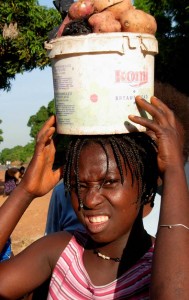
In Bissau - too young to carry the burden of marriage. Photo: M.Sayagues
She was a brave little girl, who believed in her right to choose how to live her life. Aged 12, as a minor she remained nameless in the news.
She lived in Zimbabwe’s Eastern Highlands, the green, misty mountains along the Mozambican border. On weekends, people dressed in flowing white robes, the men bearded, holding carved wooden canes, gather under the masasa trees. They belong to the Johanne Marange apostolic sect. Peaceful people – with a nasty habit of marrying young girls.
The girl was given as second wife to her older sister’s husband, a pastor in his fifties. She escaped to her uncle’s home but he brought her back. She got a beating, and escaped again. She sought the school teacher and he brought her back. She got another hiding, and escaped again. She went to the police, and they brought her back. Then she hanged herself.
That was in 2001. Her death was just a news blip among violent farm invasions.
Although against the law, child weddings continue in Zimbabwe, and likely on the rise due to poverty, says a new study by Women and Law in Southern Africa. Adults and social institutions still fail to protect girls.
Parents: criminals or ignorant?
Years later I did a story on child marriage in Gabu, in eastern Guinea Bissau. Interviewing parents and chiefs, I heard that misery, coupled with fear of AIDS and out of wedlock pregnancy, drove the practice.
The parents I talked to were ignorant and poor, not evil. They did not know any better. They lived in a failed state that fails to deliver basic services. Just to finish primary school in rural Bissau is a victory.
In April, a Mauritanian mother living near Cadiz, Spain, was sentenced to 17 years in prison for marrying her daughter, then aged 13, to a distant cousin, and forcing her to have sex with him.
The wedding took place in Mauritania in 2005 and the sex in Spain in 2007 when the husband visited his teen wife, who continued living with her parents. He got a 13-year jail sentence, and her illiterate father, 18 months.
The girl’s two younger siblings returned to Mauritania, where protests have unfurled.
Child marriage should be eradicated like smallpox – but is this harsh, family-splitting prison sentence the best solution?
A short stay in prison and extended community service at a Muslim NGO that promotes gender equality would emphasize education over repression.
From another perspective: what mechanisms does Spain have to teach its family laws to its immigrant cheap labour? Driving a car without a licence is not allowed. Work permits could be tied to a quick test: knowing Article 16 of the Universal Declaration of Human Rights, prison sentences for genital cutting and child marriage, and local laws that protect the rights of little girls.
]]>